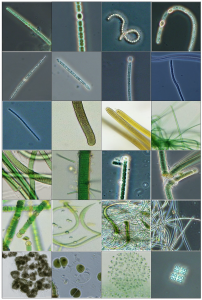Southwestern states and Pacific Islands are experiencing increasing occurrences of harmful algal blooms in both coastal ocean and freshwater bodies. Recently the U.S. Environmental Protection Agency (EPA) in collaboration with a key regional partner, the California Surface Water Ambient Monitoring Program, convened a forum for federal, state, tribal and local agencies, lake managers, and water utilities to discuss current, emerging, and advanced HAB issues.

Freshwater cyanobacteria found in the California coastal ocean that cause harmful algal blooms. (Credit: Avery Tatters, USC)
NCCOS scientists Marc Suddleson, Richard Stumpf, and Jennifer Maucher were featured speakers at the EPA Region 9 Harmful Algal Blooms Meeting, April 25–27, 2017, Costa Mesa, CA. They provided a national perspective on federal HAB research and programs authorized by the Harmful Algal Bloom and Hypoxia Research and Control Act (HABHRCA) and shared recent advances that are helping regional stakeholder manage HAB impacted resources. NCCOS talks highlighted:
- Sponsored research advances in monitoring (CalHABMAP) and forecasting (C-HARM) that are providing early warning for marine HABs and new monitoring protocols being developed to better assess an emerging HAB issue associated with multiple cyanobacteria toxins in estuaries
- NOAA's response to an unprecedented 2015 West Coast HAB event
- Efforts to adapt satellites to remotely detect cyanobacteria blooms in large estuarine and freshwater water bodies and planned expansion of the NOAA HAB Operational Forecast System
- Phytoplankton monitoring with citizen-scientists and training for attendees on cyanobacteria identification via microscope
Speakers from Southern California Coastal Water Research Project, University of Southern California, University of California San Diego, University of California Santa Cruz, University of North Carolina Chapel Hill, and the NOAA Northwest Fisheries Science Center also highlighted NCCOS HAB research benefiting the region.
 Official websites use .gov
A .gov website belongs to an official government organization in the United States.
Official websites use .gov
A .gov website belongs to an official government organization in the United States. Secure .gov websites use HTTPS
A lock or https:// means you’ve safely connected to the .gov website. Share sensitive information only on official, secure websites.
Secure .gov websites use HTTPS
A lock or https:// means you’ve safely connected to the .gov website. Share sensitive information only on official, secure websites.